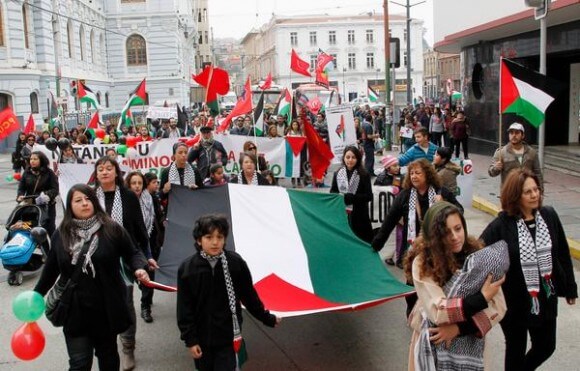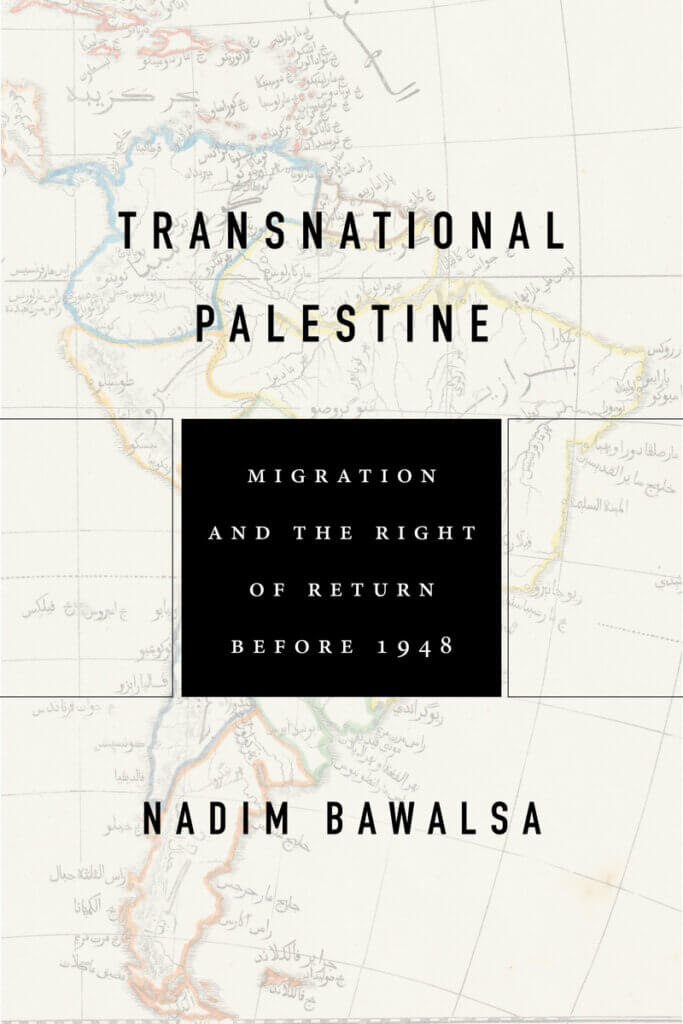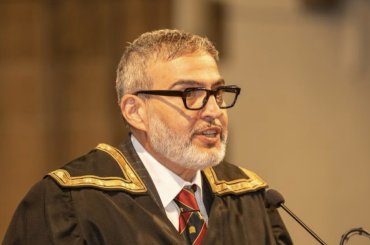TRANSNATIONAL PALESTINE
Migration and the Right of Return Before 1948
by Nadim Bawalsa
298 pp. Stanford University Press, $28.00
What does it mean to be Palestinian? How do you experience exile when you live thousands of kilometers away from your homeland before the advent of modern telecommunications? Was the right of return for Palestinians born with the Nakba in 1948, or is it actually older? These are some of the crucial questions Nadim Bawalsa addresses in his recently published work, Transnational Palestine: Migration and the Right of Return Before 1948. Bawalsa, a historian by training, is currently the editor of the Palestinian Policy Network, Al-Shabaka, and has written a book about the Palestinians’ right of return. This is atypical in at least two significant dimensions: its geographical focus — Latin America — and the historical period it covers — the 1920s and 1930s.
Bawalsa draws our attention to a relatively under-studied phenomenon: the fate of those Palestinians that migrated to Latin America before the beginning of the First World War. After Turkey signed the 1923 Lausanne Treaty, these Palestinian migrants lost their Ottoman citizenship and “effectively became stateless.”[1]
Meanwhile, a British Mandate approved by the League of Nations had replaced the Ottoman administration in Palestine. In 1925, the British promulgated the Palestinian Citizenship Order-in-Council. The order stipulated that Palestinians living abroad had two years to apply for Palestinian citizenship provided they had lived in Palestine for at least six months during these two years. Furthermore, the success of the application was contingent on Palestinians proving their intention to permanently settle in Palestine if citizenship was granted.
To add insult to injury, when three months had passed since the approval of the Palestinian Citizenship Order-in-Council, the initial two-year period to apply for citizenship was shortened to only one year. The amendment was not widely publicized abroad, and consequently, many Palestinians in Latin America were unaware that, considering that three months had already passed and a minimum of six months of residency in Palestine was required, they were now forced to be in Palestine in only three months in order to qualify for citizenship.
Merchants without a homeland
The characteristics of the Palestinian migrants in Latin America made them particularly vulnerable to the 1925 Palestinian Citizenship Order-in-Council. The migrants — most of them Christians — had often initially made a living in America by peddling Holy Land goods such as olive wood, oils, and other products brought from Palestine. With the passing of time, many Palestinians in Latin America established themselves as traders or business owners on the American continent.
These Palestinian entrepreneurs had invested money and personal effort in establishing trade networks and social relations with the local population that could only be abandoned at a high cost if forced to return to Palestine with short notice. Moreover, many Palestinians in Latin America were frequent travelers for business purposes. Lacking a valid passport, they would see themselves handicapped in their business opportunities.
Transnational Palestine shows that Palestinians in Latin America were unjustly denied their national rights long before the State of Israel was created.
The unfair conditions imposed on Palestinian migrants who sought to be recognized as Palestinian citizens did not exist in a vacuum. As Bawalsa explains, “the decisions to approve Jews’ applications for citizenship and to reject Palestinian migrants’ were invariably intertwined.”[2] Throughout the Palestine Mandate period, as American-British author Charles Glass aptly summarizes, British authorities “protected Jewish immigration, encouraged Jewish settlement, subsidized Jewish defense, and “protected” the Yishuv (as Palestine’s minority Jewish community called itself) from the native population.”
The Palestinians of Latin America did not remain passive in the face of the injustice they experienced. They mobilized through their social organizations and newspapers to contest Britain’s Palestine migration policy. British authorities in London and Jerusalem were swarmed with thousands of petitions from Palestinians in Latin America. Although Latin America’s Palestinians occasionally found a receptive audience among some British consuls in the continent and officials in London and Jerusalem, the statistics quoted by Bawalsa speak for themselves.
By 1937, Palestinians in Latin America had filed 9,000 applications for citizenship, and not more than 100 — a paltry one percent — had been accepted. If there were not more applications, it was because “the virtual impossibility of obtaining citizenship dissuaded many emigrants from even trying,” as noted by Professor Cecilia Baeza — who has written extensively on the Palestinian diaspora in Latin America.
Transnational Palestine studies in-depth the mobilization against the Palestinian Citizenship Order-in-Council in Mexico and Chile, two of the countries that hosted more Palestinian migrants. Bawalsa’s work – which builds on archival research in London, Jerusalem, and Santiago de Chile – demonstrates that petitioners skillfully resorted to the language of international law. They argued that the highly restrictive conditions for citizenship imposed on Palestinian migrants were an abuse of the power Britain was vested with by the League of Nations when the Palestine Mandate was created.
Moreover, petitioners used specific strategies targeted at the British and their self-image as benevolent administrators. Thus, a petition of the Centro Social Palestino in Monterrey, also supported by Palestinians living in other Mexican cities, argued that Britain’s Palestine migration policy “does not appear either just nor reasonable for a nation, like England, with extremely liberal rules of conduct, which permits the full exercise of all kinds of rights.”[3]
Fighting statelessness
Occasionally, the arguments had a more emotional component. Another petition written by Mexican Palestinians explained that if they were not granted Palestinian citizenship, they “would be outlaws, men without a country, persons without the fundamental ties of a native land.” [4] Considering that their countries of residence were reluctant to naturalize Palestinian citizens, the specter of permanent statelessness loomed over the Latin American Palestinians. They were denied “the right to have rights”, as Hannah Arendt described the situation of those who — like herself for eighteen years — had become stateless.
“Transnational Palestine” is not only a description of the painful uncertainty in the lives of Latin American Palestinians. It is also a discussion of how, through the powerful mobilization of this group of Palestinians, Palestine became truly transnational. The Latin American Palestinians were often aided by their relatives in Palestine and its Arab authorities. In fact, as Lauren Banko notes, “the Palestinian Arab Executive leadership unanimously rejected the citizenship legislation on the basis that it denied citizenship to native-born Palestinians.”
The petitions to the British of most Latin American Palestinians were unsuccessful. However, as Bawalsa remarks, “in the process, they formed into a distinct political and legal collective that was decidedly Palestinian and that was committed to achieving Palestine’s self-determination.”[5] Their mobilization re-defined the meaning of “Palestinianness,” which became a cross-continent identification two decades before the Nakba forced hundreds of thousands of Palestinians out of their homeland.
It was UN mediator Count Folke Bernadotte who first referred to the Palestinians’ right of return to Palestine in 1948 — before being assassinated by the Stern Gang, an extremist Zionist organization headed by Menachem Begin, who would later become the Prime Minister of Israel. What Transnational Palestine shows is that Palestinians in Latin America were unjustly denied their national rights long before the State of Israel was created. Bawalsa succeeds in widening the reader’s temporal and geographical horizons when thinking about the right of return, and in doing so, he helps us to better understand the Palestinians history of dispossession.
[1] Nadim Bawalsa, Transnational Palestine: Migration and the Right of Return Before 1948 (Stanford: Stanford University Press, 2022), p. 75.
[2] Ibid., p. 85.
[3] Ibid., p. 127.
[4] Ibid., p. 133.
[5] Ibid., p. 112




They were “dispossessed” from as far back as the 19th century, before the British Mandate, Balfour and all the other excuses they love to whine about. This was the Turks doing as the Turks were persecuting Christians throughout their empire at this time.